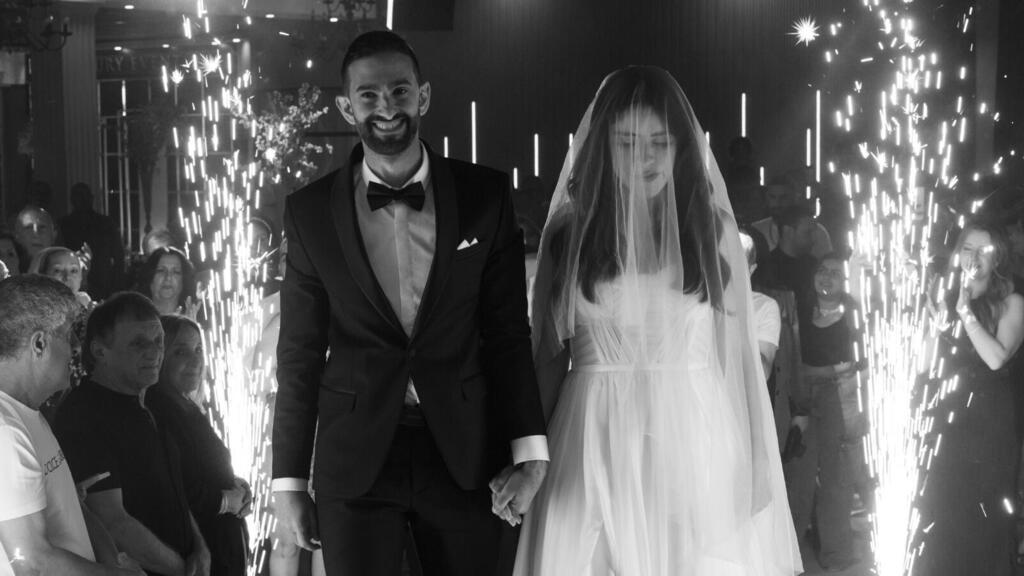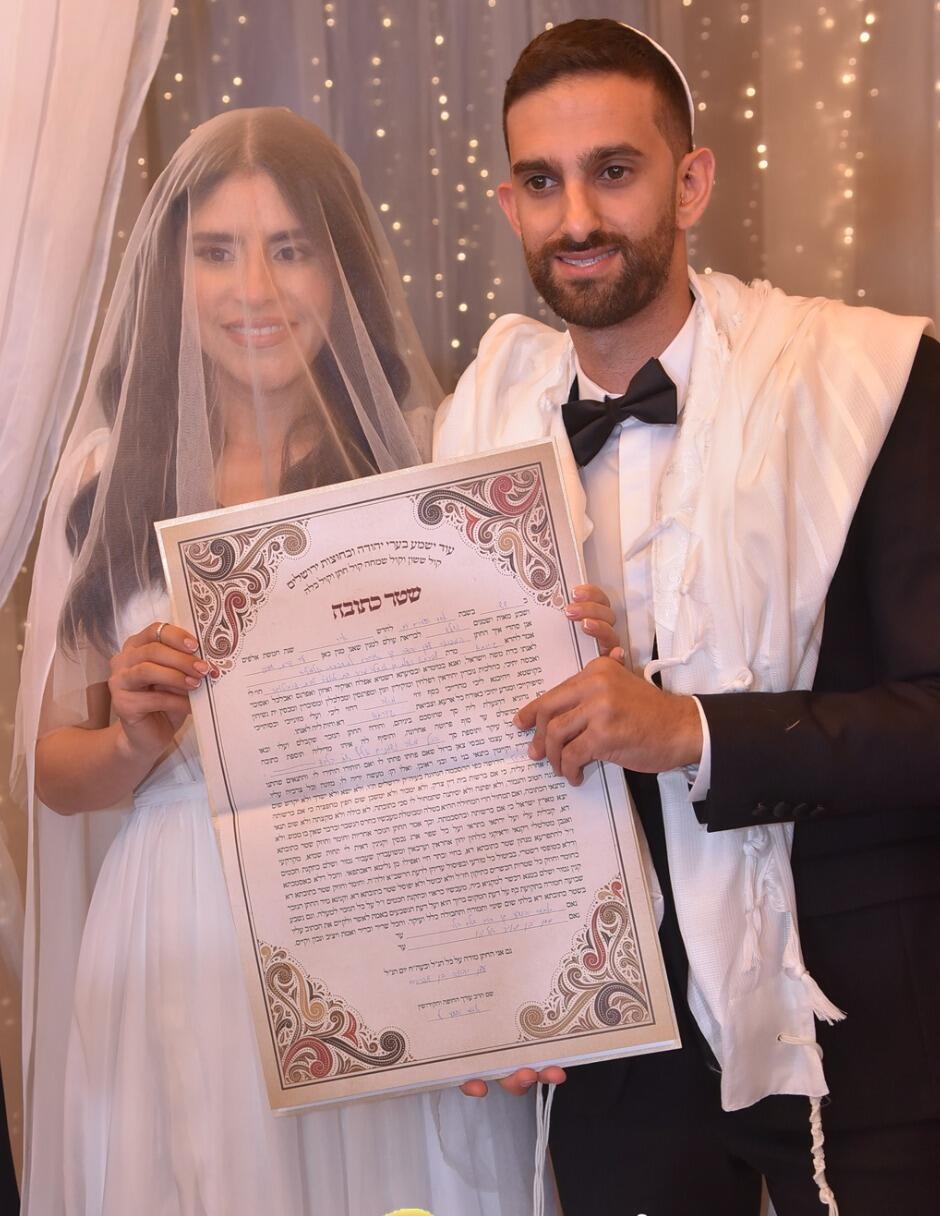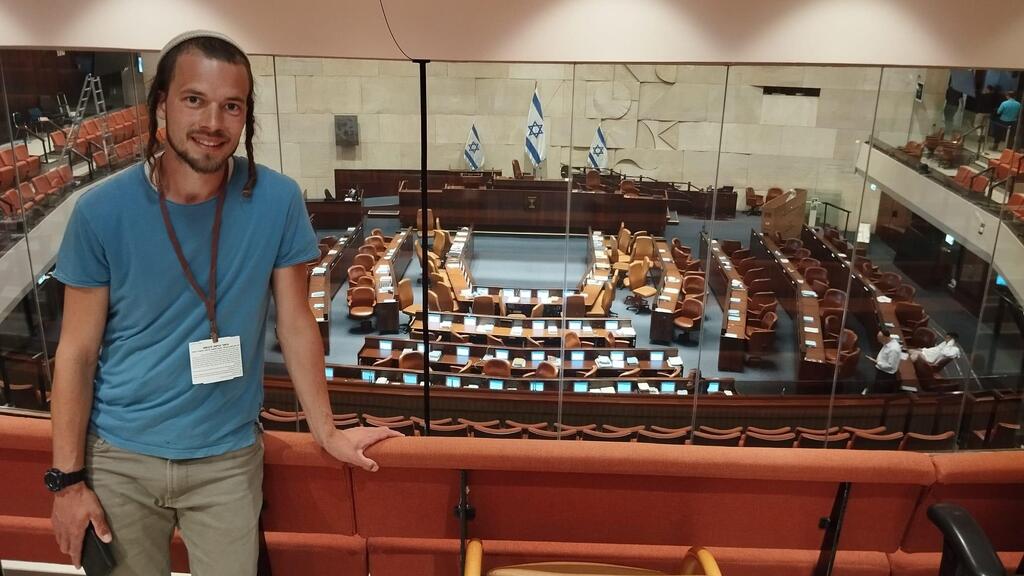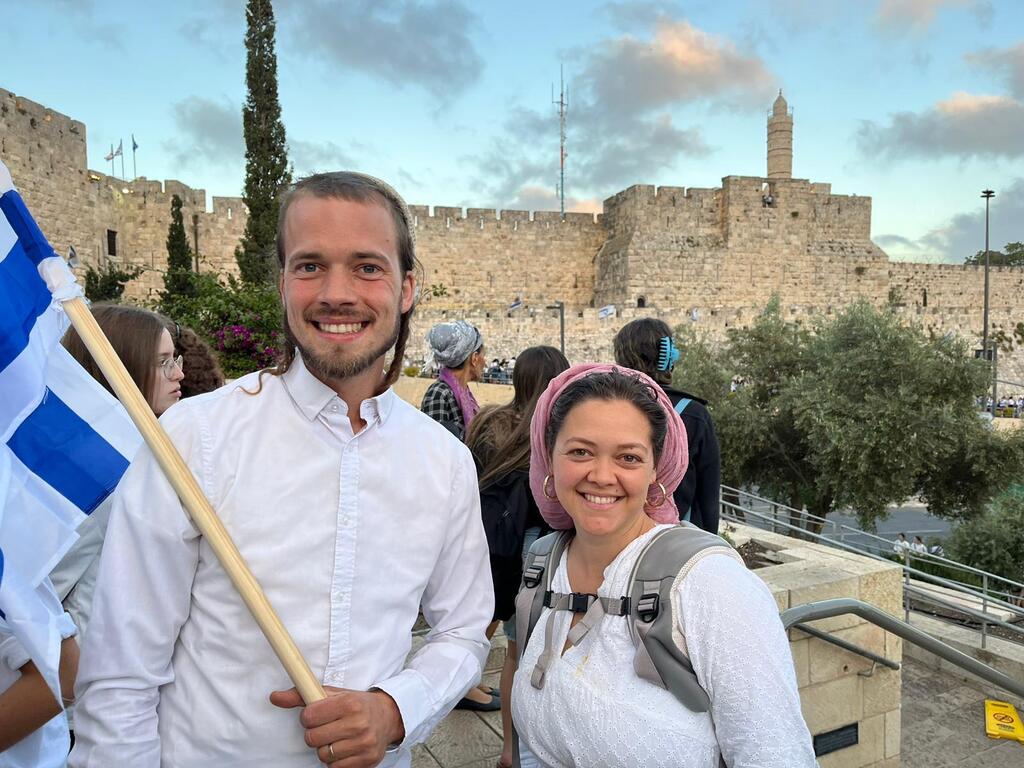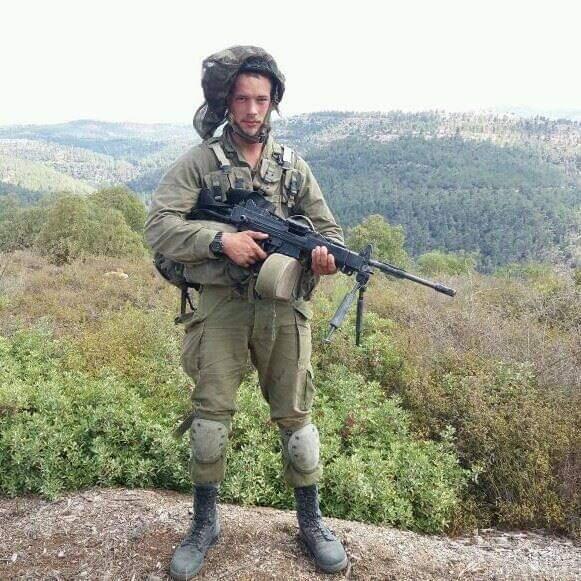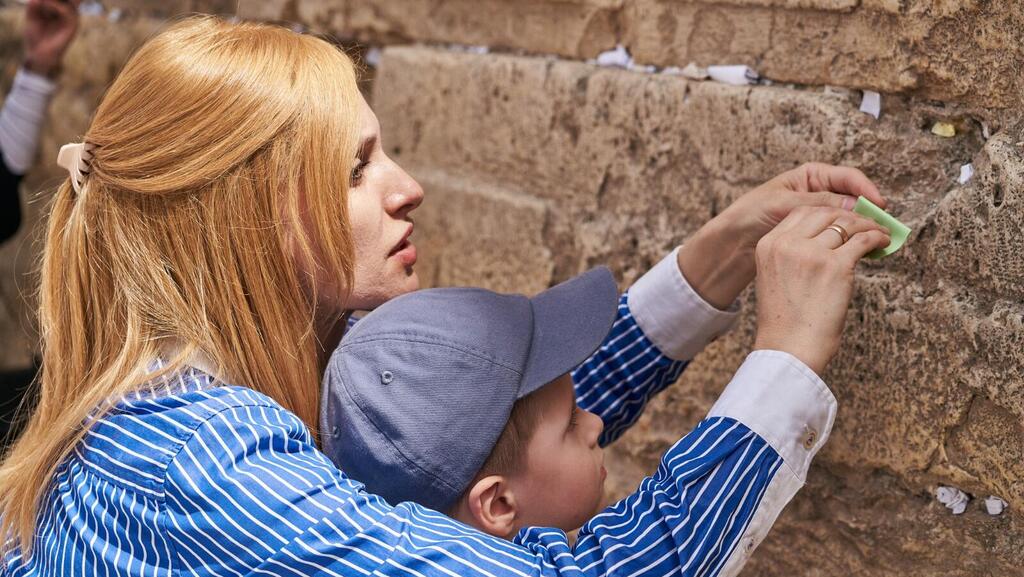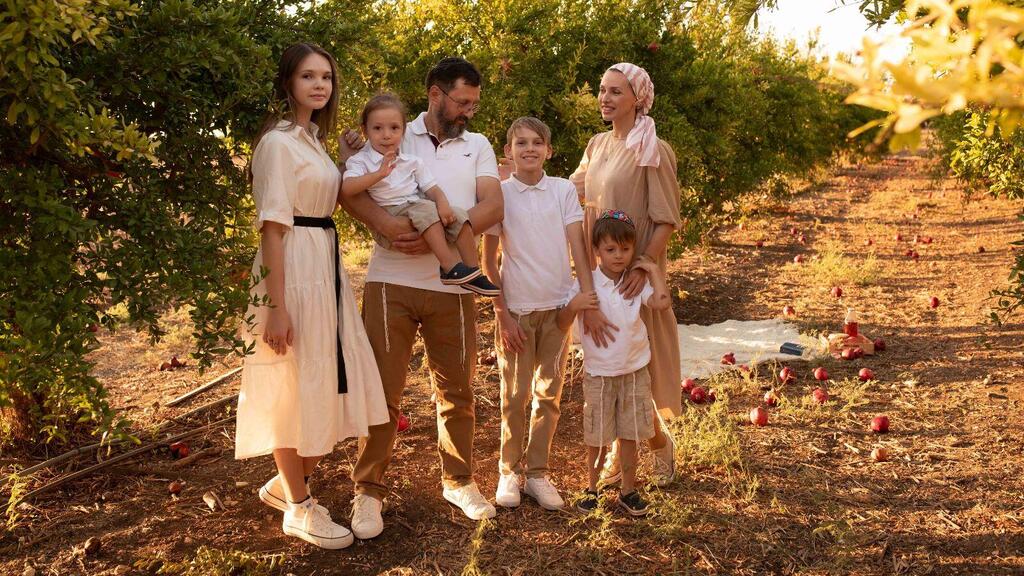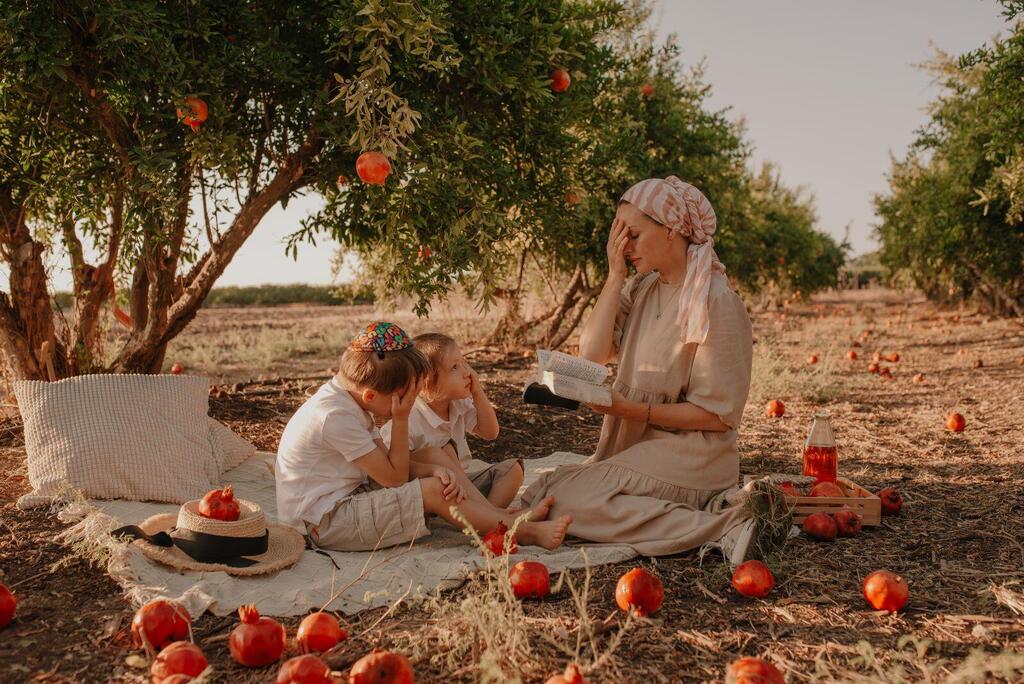Angela Almaliach, originally from Colombia, describes how she felt moved when she read the Book of Ruth for the first time: "I felt like it was also talking to me. I was excited about it. Ruth is a character who converted and was part of the family from which the Messiah would come."
Other stories:
She began to deeply explore Judaism only when she met who would later become her husband, Eden, about six years ago. "After three years of service in the IDF, I went on a trip to South America after the army. I traveled through several countries until I arrived in Cali in Colombia," Eden recounts.
"I was traveling with two girls, also from Israel, and one of them wanted to go and learn salsa dancing, so she asked me to come with her to a lesson. That's where I saw Angela, who came with another friend of hers. We continued to travel together, and they showed us around Cali. That's how a close connection developed between Angela and me. We also started to travel alone, and she introduced me to the places as a tourist."
"When I returned to Israel, we kept in touch, and Angela told me that she wanted to visit Israel once to get impressed and get to know the country. I said there's no problem, we'll do the opposite, and this time I will show her the places in Israel," he recalls.
On her first visit to the country, their connection remained friendly, but on her second visit to Israel, their relationship developed and became romantic – and Angela stayed in the country for an extended period of time.
"At first, we were friends, and I didn't really care that he was Jewish," she says. "I grew up in a Christian Catholic family, but we weren't really deeply religious. My mom didn't tell us that we had to go to church or celebrate the holidays. I didn't believe that I had to go to church for God to be with me."
Eden introduced her closely to Judaism. "When I met Eden, I asked him questions, and he told me about Shabbat. I didn't know anything about it. He also told me about Passover, and I was curious about Judaism and started asking him a lot of questions. He explained to me that he couldn't be with me if I wasn't Jewish because it was important to him that his children would be Jewish.
When I came here and saw that we had a strong connection and love, I decided to convert. I made that decision because I wanted to, and it was important to me, not because he told me that it was the only way I could be with him. I did it because I loved the religion, the fact that the whole family sits together on Shabbat, and I started going to the synagogue."
After going through the conversion process through the Conversion Authority in the Prime Minister's Office, she received the Hebrew name, Ariella. Today, the couple resides in Tirat Carmel.
According to her, "The process took a long time, almost four years. When I received my visa to Israel, we submitted a request to the Rabbinate. I saw that time was passing, and I wasn't progressing. I am 33 years old, not a young girl anymore. We wanted to get married and have children. It was difficult for me, but I understood that it comes from above. I am happy that I converted, we got married, and I am now pregnant, and everything worked out. We went through it together, Eden was always there for me."
'It was natural for me to fall in love with the people as well'
Angela is one of three immigrants we spoke to, as they came to Israel from different parts of the world and now share what led them to Judaism and how they decided to connect their destiny with the fate of the Jewish people.
According to data from the State Conversion System, in 2022, a record number of 3,904 conversion files were submitted, indicating requests to initiate the process. In the same year, 2,097 conversion certificates were issued, indicating completion of the process through the civil conversion track – a decrease compared to the previous year (2,518).
Daniel Ben Eliyahu currently lives in the community of Tekoa in Gush Etzion with his wife and three children. However, he grew up far from there, in the city of Uppsala in Sweden. He was born into a devout Christian family that regularly attended church, and at least until he was 17, there was no indication of the path he was destined to take in his life, even though his mother held a warm place in her heart for Israel.
"My grandmother took my mother to visit Israel, and my cousins volunteered on the kibbutz. I even have a cousin who speaks Hebrew, despite not being Jewish, and that is rare in Sweden," he explains. "My mother was very enthusiastic about Israel, and my parents' honeymoon was in Israel."
When he was a teenager, his mother visited Israel again, this time with him and his sister. A conversation at a hotel in Tel Aviv sparked their reevaluation of Christianity and Judaism.
"We met the hotel owner, who was a Christian missionary, a Jewish man who converted to Christianity, and he told us that it seemed strange to him that people in churches worship Jesus as if he were God himself," recalls 31-year-old Daniel. This was the opening shot of a journey that took place alongside his mother and sister.
"I began to take an interest in Judaism and learn Hebrew in order to read the Bible in the original language," he recounts. "Translation is always somewhat interpretative. I wanted to go back to the beginning, to the source. We reread the verses and understood that we need to observe the commandments. It took another year or two until we realized that Jesus is not the Messiah."
In the end, he, his sister, and his mother converted. His parents divorced 12 years ago, unrelated to his mother's conversion process. His mother made Aliyah, while his father remained in Sweden. "My father loves us very much and visits us, but it is difficult for him because we no longer live in Sweden," he shares.
In 2014, he arrived in Israel with the intention of staying. "I arrived in the settlement of Alon Shvut. I wasn't afraid when I arrived in the area, and I didn't even think it could be dangerous. When there was a terrorist attack, I made sure to go specifically to the place where the attack occurred, believing that if we don't go to these places, they will prevail."
At the age of 24, he volunteered to serve as a combat soldier in the IDF and joined the Haredi Nahal Tomer Brigade. For a whole year, he lived with Rabbi Yisrael Rosen, may he rest in peace, the head of the Zomet Institute and founder of the Conversion Administration. His sister had known the rabbi even before him, and he also accompanied her in the process. "We were very connected to him, like part of the family, and he helped me with everything I needed."
Today, he manages a grocery store in the community of Nokdim. He met his wife, Hodaya an Israeli-born who grew up in Tekoa, in an unconventional way. "She studied at the Mahon Ora, was very interested in the elderly, and wanted to help them. She invited my sister to her home. Then my sister invited her, and that's how we met.
I wrote her a message expressing my interest in her, I was still a gentile, and she was hesitant about it. After about a year, she decided she wanted to try it after all. We went on our first date two weeks before I immersed myself in the mikveh (ritual bath), after I had already accepted the yoke of Heaven and underwent circumcision." After another year, they got married.
Before conversion, his name was Daniel Ishmael Paterson. "All my life, I searched for what to do for God. In Christianity, there are no practical commandments. My younger sister had a question about how one can serve God, and my mother said it was possible, but she didn't know how," he says.
"When we went through conversion, we learned that it's possible to serve God. Now we have a path, a route, a way of life. That was the first reason we wanted to undergo conversion, and the second reason was that we wanted to be part of the Jewish people. We loved Israel and the language, and it was natural for us to also fall in love with the people."
From ravaged Ukraine to Netanya
Yael Agpova and Aharon Yosef Agpov currently live in Netanya as an observant Jewish couple in all matters, but until a few years ago, they were called Yulia and Yevgeny and lived in the city of Dnipropetrovsk in Ukraine, without ever considering conversion. The process that swept the entire family began with Yael's familial discovery.
"I had no connection to Judaism, and 15 years ago, my mother told me that I have Jewish ancestry from my father's side," she recalls. "I began to take an interest in Judaism, which led me to visit a synagogue in Dnipropetrovsk, and there I started to study Judaism."
How did you feel in the Jewish environment?
"When I met the people in the Chabad Jewish community in Dnipropetrovsk, I really liked their behavior. I saw the way Jews treated each other in the community, their assistance to others, and especially their attitude toward children, and it touched me. I saw how much they invested in children and the sense of family there. I started dressing modestly and covering my head to resemble them, even before I even thought about conversion."
"I continued going to the synagogue and met my husband," she continues to describe, "He wasn't Jewish either, but he loved me so much and saw that I was serious about it. I didn't pressure him to study Torah, but after we had been married for three years, he started attending Torah classes – and since then, he's been deeply immersed in it.
He goes to classes more than me and studies Gemara. Without pressure, only with love and devotion, I led the whole family to a state of observing the commandments, and we all converted a year and a half ago."
What did you do when Russia invaded Ukraine and the war broke out?
"It was surprising because there were rumors and signs of Russians preparing, but people didn't think it would be serious. On February 24, 2022, the Russians attacked, and our building shook. It frightened everyone, and we realized we couldn't stay in the city.
We gathered the children and the most essential belongings into the car and moved to the suburbs. We thought that after a few days, the situation would calm down. Over time, we understood that the situation wasn't improving, and it would last longer than we thought."
Amidst the constant bombings, the family fled Ukraine and crossed the border to Poland. They connected with the Jewish community in Warsaw and lived there for a month and a half. In March 2022, they made aliyah to Israel. Initially, they lived in Ra'anana and later moved to Netanya.
The ITIM: Resources and Advocacy for Jewish Life organization assisted the family in their integration into the country and in the process of obtaining citizenship based on their conversion.
The couple has two children together, in addition to two children from previous marriages. Their first encounter with the Jewish community was with Chabad, but they do not identify themselves as part of a specific community because unity with Israel is important to them.
"For our families, it wasn't clear why we chose the path of Judaism, and in my husband's family, it led to several conflicts. Over time, they understood that it was serious and that it made us happy, and the situation improved"
"Ever since I was a child, even at school, I felt different from others," she shares. "When I came to the Jewish community, I felt right at home, like everyone else, on the same wavelength. We saw the efforts of religious Jews to live in this world while giving it a spiritual meaning. It was something I was missing in the past."
"Another thing that captivated me was the joy of Jewish life and the perception that everything done in this world has meaning and is for God. I always struggled with reality and circumstances, but now I feel how life harmonizes with this world. I am happy to be Jewish and to be part of the people of Israel."


